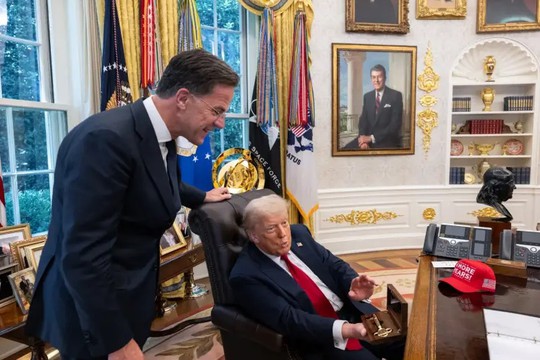Europeans tremble before Trump. Just look at how humiliatingly NATO Secretary General Mark Rutte behaves with the US President in the Oval Office of the White House.
Photo: The White House
A “humiliation”, “economic surrender” and rhetoric that “appears to have been stolen from the adult entertainment industry”. These are just a small selection of Europeans’ reactions to how their leaders have kowtowed to Donald Trump — first for accepting the US president’s demand that Nato countries spend 5 per cent of national income on defence, then by endorsing a trade “deal” that leaves the EU much worse off than before, ‘The Financial Times’ notes.
When Trump returned to the White House, European leaders seemed unconvinced as to how to handle him. By now, their strategic choice is evident. It is accommodation rather than confrontation, accompanied by flattering rhetoric noisily praising Trump’s peace- and dealmaking prowess. The question is whether the loss in self-respect has been worth it. Speak to those close to the decision-making, and the refrain is that “no one is being naive here”. Instead, the plea is pragmatism.
Three specific claims can be discerned. First, since talk is cheap, why not flatter Trump? Second, what’s been achieved is better than the alternatives (kneecapping Ukraine’s defence and outright trade war). With luck, EU companies may even benefit from the still-higher tariffs put on much non-European trade. And third, policymakers will admit sotto voce that many of Europe’s pledges to Trump are just for show. Pledges of 5 per cent defence spending and huge investment and purchasing sprees in the US aren’t realistic or intended to be kept but dumb Trump bought them, so well done us.
That this stance is unprincipled is incontestable; a principled response would be to fight back. The bigger problem is that it fails proponents’ own test of pragmatism. True pragmatism would be to reduce exposure to a hostile US. What advocates call pragmatism is in fact opportunism — which is not only unsavoury but is also causing real damage, not least to Europe’s own politics.
As Trump understands so well, talk is not in fact cheap. Political talk sets expectations and shapes power. Mark Rutte’s and Ursula von der Leyen’s ingratiation with Trump matters, because it means foreign leaders now freely grant him what he has already imposed at home: the acceptance that achieving anything requires not speaking the truth. European leaders have also endorsed Trump’s conception of politics as TV performance. As a result, his tantrums, bullying and craving for ritual subjugation are being normalised on the international stage.
Further, Europe has sacrificed the ability to call out his violation of international treaties — such as the World Trade Organization’s requirement of the most-favoured nation principle. It has also fallen in with the idea that results are achieved through personalised bargaining between great men (and occasionally women), rather than the painstaking work of democratic deliberation and consensus building.
But note what these choices have cost Europe. It has shed all the political capital it could have mobilised to lead a coalition of countries in defence of rules-based trade and a concerted opposition to Trump. Not only that, it has betrayed its American friends, who had counted on Europe standing up to Trump while they struggled to do so themselves.
Most importantly, Europe is risking its political soul. It has put itself in a situation in which leaders cannot say publicly what they are actually trying to do. That is a recipe for distrust and a poison for democracy — and European liberal democracy in particular. How can voters endorse policies whose true nature cannot be admitted publicly (such as the promises to Trump not being real)? If the EU hypocritically accepts what economist Richard Baldwin terms the “grievance doctrine” of globalisation, how can it repel anti-European forces thriving on those views at home?
The danger, then, is that European Trump-whispering subordinates the need for broad accountability to a Trumpian “trust the leader” focus on dealmaking, and the inherent authoritarianism this entails. By letting Trump’s will triumph over reality, European leaders’ supposedly pragmatic defence of their own collective interests is in fact accelerating the Trumpification of politics across the continent.
read more in our Telegram-channel https://t.me/The_International_Affairs

 11:44 28.08.2025 •
11:44 28.08.2025 •























